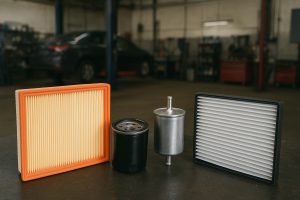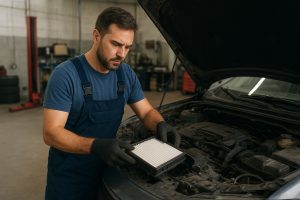Car filters are the unsung heroes of vehicle performance. They quietly protect your engine, cabin, and fuel system from contaminants that can cause wear and inefficiency. Yet despite their importance, many car owners still believe common myths about filter replacement — often leading to costly damage or reduced performance. In this article, we’ll uncover and debunk the most widespread misconceptions about air, oil, fuel, and cabin filters — and explain what you should really know to keep your car running smoothly.
Why Filters Matter More Than You Think

Your car relies on several types of filters, each designed to protect a specific system:
| Filter Type | Main Function | Common Replacement Interval |
|---|---|---|
| Engine Air Filter | Keeps dirt and debris out of the engine | Every 15,000–25,000 km |
| Oil Filter | Traps contaminants in engine oil | Every 8,000–15,000 km (with oil change) |
| Fuel Filter | Filters impurities from fuel before it reaches injectors | Every 30,000–60,000 km |
| Cabin Air Filter | Purifies the air entering the cabin | Every 12,000–20,000 km |
Ignoring these intervals or believing in myths about “lifetime filters” can lead to clogged components, reduced performance, and even engine failure.
Myth #1: “Filters Only Need Replacement When They Look Dirty”
Reality: A filter’s appearance doesn’t always reflect its actual condition.
Filters are designed to trap microscopic contaminants invisible to the naked eye. Even if a filter looks “clean,” it may already be restricted internally. Conversely, a slightly dusty filter can still perform well.
Why it’s wrong:
-
Air filters lose efficiency long before visible dirt builds up.
-
Oil filters may look fine externally but have clogged media inside.
-
Cabin filters can trap gases and allergens that aren’t visible.
Expert Tip: Follow the mileage or time-based replacement schedule, not just visual inspection.
Myth #2: “Aftermarket Filters Are Always Worse Than OEM”
Reality: Quality aftermarket filters can perform just as well — or even better — than original equipment manufacturer (OEM) parts.
Modern filter manufacturers use advanced synthetic materials, multi-layer construction, and ISO-certified testing to meet or exceed OEM standards.
Comparison Table:
| Aspect | OEM Filter | High-Quality Aftermarket Filter |
|---|---|---|
| Fit and Compatibility | Perfect match | Usually identical when certified |
| Price | Higher | More affordable |
| Performance | Standard | Often equal or improved |
| Availability | Limited to brand dealers | Widely available |
You can explore certified aftermarket options and buy filters online to find reliable replacements for your specific vehicle.
Myth #3: “Performance Filters Never Need Replacement”
Reality: Reusable or “performance” filters still require regular maintenance.
While they’re designed to be cleaned instead of replaced, neglecting them leads to clogging, reduced airflow, and potential sensor damage.
Maintenance mistakes include:
-
Cleaning too rarely (should be every 15,000–20,000 km).
-
Using the wrong cleaning fluid or too much oil on oiled filters.
-
Not letting the filter dry completely before reinstallation.
Result: Poor airflow, inaccurate air–fuel ratios, and reduced engine efficiency.
Myth #4: “A Dirty Air Filter Improves Fuel Economy”
Reality: This myth is completely false.
Some drivers believe that a restricted filter causes a “leaner” air–fuel mix, reducing fuel use. In reality, modern engines use mass airflow sensors that automatically adjust the fuel ratio. A dirty filter forces the engine to work harder to pull air, reducing both power and fuel efficiency.
Symptoms of a clogged air filter:
-
Sluggish acceleration
-
Black smoke from exhaust
-
Decreased fuel mileage
-
Engine misfires or hesitation
Fact: Replacing a clogged air filter can improve fuel efficiency by up to 10%, especially in older engines.
Myth #5: “Cabin Filters Don’t Affect Vehicle Performance”
Reality: While cabin filters don’t impact engine performance directly, they affect HVAC efficiency and overall comfort. A clogged cabin filter restricts airflow through the heating and cooling system, forcing the blower motor to work harder — leading to:
-
Weak airflow from vents
-
Foggy windows
-
Increased blower noise
-
Higher energy consumption
In severe cases, a dirty filter can even shorten the lifespan of the HVAC blower motor.
Conclusion: Cabin filters are not just about clean air — they are vital for maintaining the vehicle’s comfort system.
Myth #6: “Fuel Filters Last the Lifetime of the Vehicle”
Reality: Even if some modern cars have “lifetime” filters integrated with the fuel pump, no filter truly lasts forever. Over time, fuel contaminants — rust, dirt, and moisture — accumulate and restrict flow.
Consequences of neglecting the fuel filter:
-
Rough idling
-
Poor acceleration
-
Hard starting or stalling
-
Fuel pump damage (a costly repair)
Regular replacement protects your fuel system and ensures consistent engine performance.
Myth #7: “All Filters Are the Same”
Reality: Not all filters are created equal.
The quality of the filtration media, sealing materials, and construction determines how well a filter performs under pressure and temperature extremes.
Differences Between Low-Quality and Premium Filters:
| Feature | Low-Quality Filter | Premium Filter |
|---|---|---|
| Filter Media | Thin, uneven fibers | Multi-layer synthetic material |
| Seals & Gaskets | Prone to leaks | Heat-resistant rubber |
| Efficiency | 60–80% | 95–99% |
| Lifespan | Short | Long-lasting under harsh conditions |
A premium filter ensures reliable protection — especially for engines running on synthetic oils or under heavy loads.
Myth #8: “Changing Filters Is Complicated and Expensive”
Reality: Many filters can be replaced at home in minutes using simple tools.
Air and cabin filters are typically accessible without specialized equipment, and oil filter replacement is often part of a routine oil change.
DIY filter replacement steps:
-
Locate the filter housing (engine bay or cabin area).
-
Remove the old filter carefully.
-
Clean surrounding areas.
-
Insert the new filter in the correct orientation.
-
Close and secure the housing.
This quick task saves you time and money — and ensures optimal vehicle performance.
The Truth About Filter Replacement

Filters are essential components that protect your vehicle’s systems from damage and maintain efficiency. Believing in outdated myths can lead to costly repairs and reduced driving comfort.
Key Takeaways:
-
Replace filters based on mileage, not appearance.
-
Quality aftermarket filters can be as good as OEM.
-
Even “performance” filters need cleaning.
-
A clean air or fuel filter enhances both performance and economy.
-
Cabin filters are essential for HVAC efficiency and your health.
When it’s time for replacement, choose high-quality components from trusted brands. You can easily buy filters online to find the perfect match for your car.